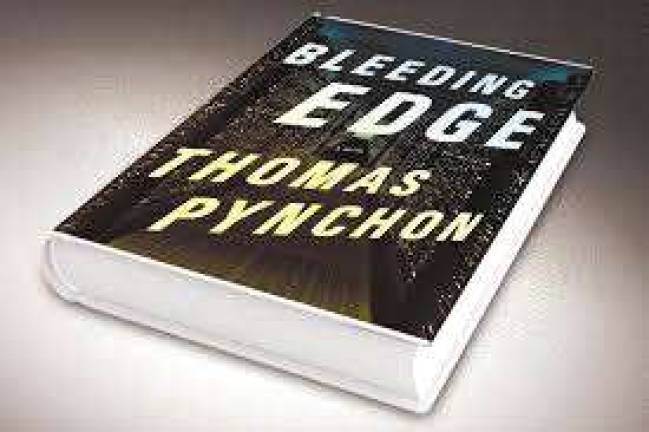Pynchon Soup for the Postmodern Soul

Visionary author takes the modern world to the Bleeding Edge
In his new novel Bleeding Edge, Thomas Pynchon uses the word "postmodern" for the first time in his fiction ? a notable event in the career of this supposed American postmodern novelist par excellence. The word crops up in a few places, including a description of a Soho nightclub bathroom containing "the godfather of postmodern toilets?with three dozen stalls, its own bar, television lounge, sound system, and deejay."
For Pynchon, ever the excremental visionary, it's a peerless expression of satiric disgust. Postmodernism has no boundaries, no sense of the sacred. It fecklessly mingles excrement with entertainment.
Pynchon makes postmodernism's insufficiencies the subject of Bleeding Edge, the surface plot of which focuses on unlicensed fraud investigator Maxine Tarnow's efforts to untangle an apparent conspiracy surrounding dotcom-era tycoon Gabriel Ice and his shadowy company hashslingrz.com. The year is 2001, 9/11 waiting in the wings for the first 300 pages or so; the setting (mostly) Manhattan; and the plot (for this reader, anyway) absolutely impenetrable.
I have every confidence Bleeding Edge's story would make sense, if one could slow the surprisingly sprightly (for a 76-year-old) arm that keeps cranking out noirish revelations and low-comic digressions. But the novel's pace, which makes hash of conventional detective-novel plotting, helps Pynchon focus the reader's attention where he wants it: on Maxine. We're forced to admire and analyze how Bleeding Edge's protagonist manages, with some difficulty, to keep her head despite the postmodern blur around her.
The blur extends beyond the book's plot to the personalities that surround Maxine, almost all of whom are archetypal New York neurotics and self-stereotypers. From Jew to WASP to Italian-American, nearly all the supporting characters play to the hilt the roles selected for them in Manhattan's ethnic drama, skewed by Pynchon into comedy. And as capitalism, in the form of greedy property developers, lays waste to New York's tangible history, these characters' desperate self-parodies increasingly have nothing to refer to, no roots in the streets.
After 9/11, most of Pynchon's people implode, getting lost in paranoid conspiracy theories or seeking solace in the "Deep Web," an underground internet space rapidly coming to resemble the "surface Web" its nerd-snob denizens disdain. By contrast, the massacre causes Maxine to come into her own. Bleeding Edge's last hundred pages attain a moral beauty unprecedented in Pynchon, as Maxine's compassion deconstructs Gabriel's conspiracy (the details of which are unimportant) strut by strut. To find comparable heroism in the oeuvre, you'd have to reach back more than 50 years to the post-Beat stories (e.g., "Entropy") with which Pynchon began his writing career. But Bleeding Edge isn't constrained by the young Pynchon's Bomb-era post-adolescent despair. Instead, a millennial strain of that same despair becomes what Maxine ministers to in the "whole sick crew" (pace V.) she meets in the 'hood.
Pynchon explicitly connects Maxine's morality to her "old yenta instincts," her deep-seated ethnic penchant for benevolent, if unsolicited, intervention. This Jewish mother offers chicken soup for the postmodern soul. Her culturally determined traits comprise her free will (or, as academics would say, her "agency"), and that's the contradictory key to Pynchon's conception of identity. Pynchon is most concerned with identifiers that reside "beyond the zero" (pace Gravity's Rainbow), in human impulses and responses that long outlive the conditions that gave rise to them. It takes decades, if not centuries, of often-traumatic history to forge a Self.